Ardipithecus - Study guides, Class notes & Summaries
Looking for the best study guides, study notes and summaries about Ardipithecus? On this page you'll find 50 study documents about Ardipithecus.
Page 2 out of 50 results
Sort by
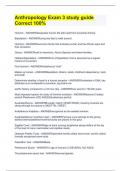
-
Anthropology Exam 3 study guide Correct 100%
- Exam (elaborations) • 3 pages • 2024
- Available in package deal
-
- $11.49
- + learn more
Hominin - ANSWERdesignates human life after split from ancestral chimps. Bipedalism - ANSWERUsing two feet to walk around. Hominid - ANSWERtaxonomic family that includes human and the African apes and their ancestors Genus - ANSWERrank in taxonomy. Above Species and below families. Habitual Bipedalism - ANSWERform of bipedalism that is assumed as a regular means of movement First hominin - ANSWERArdipithecus "Ardi" Makes us human - ANSWERBipedalism, Brains, skulls, childhood ...

-
NUSCTX 104 Final Exam Questions with well explained answers
- Exam (elaborations) • 17 pages • 2024
- Available in package deal
-
- $9.69
- + learn more
Nutrigenomics - The relationship between genes and diet Diet - Individually what someone eats Cuisine - Collectively what a population eats Physical Environment - Why do we grow what we do? Climate, soil, water, plant life, animal life. Socioeconomic environment - Broader economic and political environment affects access to food. Sociocultural Environment - Technology, social organization, and ideology Technology - A society's technology interacts with other aspects of culture (ex. fire) ...

-
BIOCHEM 32A Exam 3 MC 50 Questions and Answers Updated 2024/2025 Solved 100%; University of Notre Dame
- Exam (elaborations) • 11 pages • 2024
-
- $15.49
- + learn more
BIOCHEM 32A Exam 3 MC 50 Questions and Answers Updated 2024/2025 Solved 100%; University of Notre Dame 1. Nearly all animals are eukaryotes that undergo a stage where they are sexually immature and morphologically distinct from the adult stage. a. Heterotrophic : Larval b. Multicellular : Juvenile c. Autotrophic : Larval d. Multicellular : Autotrophic 2. During development, animals undergo a stage where they are comprised of a hollow, multicellular sphere of cells. a. Gastrula ...
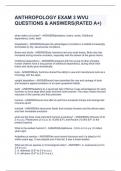
-
ANTHROPOLOGY EXAM 3 WVU QUESTIONS & ANSWERS(RATED A+)
- Exam (elaborations) • 9 pages • 2024
- Available in package deal
-
- $11.99
- + learn more
what makes us human? - ANSWERBipedalism, brains, skulls, Childhood dependency, tools, teeth biopedalism - ANSWERstresses the advantages it provided in a habitat increasingly dominated by dry, savanna-like conditions. Brains and skulls - ANSWEREarly hominins had very small brains, Brain size has increased during hominin evolution, especially with the advent of the genus Homo. Childhood dependency - ANSWERCompared with the young of other primates, human children have a long period of chil...

-
A History of World Societies_ Chapter 1 exam with complete solutions
- Exam (elaborations) • 9 pages • 2024
-
- $10.49
- + learn more
Hominid Family that humans were placed in because they shared many features with great apes Stone Age Earliest human era Previous Play Next Rewind 10 seconds Move forward 10 seconds Unmute 0:00 / 0:15 Full screen Brainpower Read More Paleolithic era Time period when people used stone, bone, and other natural products to make tools and gain food by foraging Foraging Gathering of plant products, trapping or catching small animals or birds, and hunting larger ...

-
SOCA 105 Exam 3 Snyder WVU Verified Answers
- Exam (elaborations) • 7 pages • 2024
- Available in package deal
-
- $9.99
- + learn more
SOCA 105 Exam 3 Snyder WVU Verified Answers 2 percent ️What percent different are the homo sapiens from their closet living relative? Acheulian ️lower paleolithic tool tradition associated with h. erectus Alpha Taxonomy ️refers to the discipline of finding, describing, and naming taxa, particularly species Analogy ️a comparison between two things, typically on the basis of their structure and for the purpose of explanation or clarification. anamensis ️4.2-3.9 mya sloping...
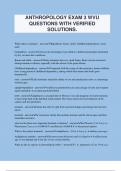
-
ANTHROPOLOGY EXAM 3 WVU QUESTIONS WITH VERIFIED SOLUTIONS.
- Exam (elaborations) • 9 pages • 2024
-
- $11.49
- + learn more
ANTHROPOLOGY EXAM 3 WVU QUESTIONS WITH VERIFIED SOLUTIONS. What makes us human? - answerBipedalism, brains, skulls, Childhood dependency, tools, teeth biopedalism - answerstresses the advantages it provided in a habitat increasingly dominated by dry, savanna-like conditions. Brains and skulls - answerEarly hominins had very small brains, Brain size has increased during hominin evolution, especially with the advent of the genus Homo. Childhood dependency - answerCompared with the young o...
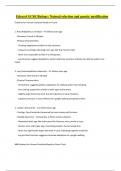
-
Edexcel GCSE Biology: Natural selection and genetic modification
- Exam (elaborations) • 7 pages • 2024
-
- $9.99
- + learn more
Edexcel GCSE Biology: Natural selection and genetic modification Evidence for Human Evolution Based on Fossils 1. Ardi (Ardipithecus ramidus) - 4.4 million years ago - Discovery: Found in Ethiopia. - Physical Characteristics: - Climbing adaptations evident in foot structure. - Long arms and legs indicating more ape-like than human traits. - Brain size comparable to that of a chimpanzee. - Leg structure suggests bipedalism, while hand bone structure indicates she did not walk on her hands. ...
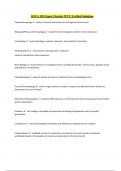
-
SOCA 105 Exam 3 Snyder WVU Verified Solutions
- Exam (elaborations) • 8 pages • 2024
- Available in package deal
-
- $9.99
- + learn more
SOCA 105 Exam 3 Snyder WVU Verified Solutions Paleoanthropology ️study of hominid and human life through the fossil record Biological/Physical Anthropology ️study of human biological variation in time and space Primatology ️study of biology, evolution, behavior, and social life of primates Anthropometry ️measurement of body parts, and bones. used for classification and comparison Bone Biology ️study of bone as a biological tissue, including its genetics, cell structure, gr...
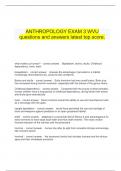
-
ANTHROPOLOGY EXAM 3 WVU questions and answers latest top score.
- Exam (elaborations) • 10 pages • 2024
-
- $12.99
- + learn more
ANTHROPOLOGY EXAM 3 WVU questions and answers latest top score. what makes us human? - correct answer. Bipedalism, brains, skulls, Childhood dependency, tools, teeth biopedalism - correct answer. stresses the advantages it provided in a habitat increasingly dominated by dry, savanna-like conditions. Brains and skulls - correct answer. Early hominins had very small brains, Brain size has increased during hominin evolution, especially with the advent of the genus Ho...

Did you know that on average a seller on Stuvia earns $82 per month selling study resources? Hmm, hint, hint. Discover all about earning on Stuvia


